Between 2 and 4 million concussions occur every year in North America.
Depending on the severity of the injury, concussion can be fatal. The death risk rate for those with a mild concussion is 2%.
This percentage goes up with the severity of the hit—it gets up to 30% for those with a more severe injury.
Thankfully, most people recover just fine.
That being said, there isn’t much you can do after you suffer a concussion: Usual directions are to get a lot of rest, sleep and take lots of fluids. The only medication your physician is likely to prescribe is something to soothe the headache.
If you’re a cannabis user, however, there’s probably one more question on your mind:
Is smoking weed with a concussion safe or not?
Well, as it turns out, cannabis is good at reducing brain swelling and helping your body recover from a head injury.
Let’s explore how.
What is a concussion?
In layman terms, concussion is basically a bruise on the brain.
A more thorough definition is that a concussion is a head injury caused by a blow to the skull. The blow produces a swelling on the brain and temporarily stops certain brain functions.
Concussion is the most common traumatic brain injury and can be also caused by a blow to the body that makes the brain bounce off the skull walls.
The brain floats in the skull and is surrounded by spinal fluid which acts as a buffer. When we suffer a hard blow, the inertia slams the brain on the skull wall—this has the potential to cause physical damage and abnormal chemical reactions in the brain, which can lead to a traumatic brain injury.
Most common causes of concussions in adults are car accidents, sports injuries and cycling accidents.
Children are also more prone to concussions—around two million kids visit the ER every year for concussion-related injuries.
Symptoms of a concussion
Most concussion symptoms occur almost immediately after the injury (or a few hours or days after), and last from several days to a week. In extreme cases, concussion symptoms can last up to a year.
Here are some common concussion symptoms:
- Dizziness
- Headaches
- Vomiting and nausea
- Difficulties with motor skills and balancing
- Light sensitivity and seeing bright lights
- Blurred or double vision
- Speech difficulties
- Noise sensitivity
- Troubles concentrating and confusion
- Amnesia
- Seizures
- Numbness in limbs
Often times, the smartest choice is to get checked out by a medical professional immediately after suffering a hard blow to the head.
Concussion treatment
Once a doctor gives a green light that there is no long-term risk related to the injury, it’s time for rest.
All the injured brain needs to recover is to take some time off from physical and cognitive exertion.
This includes abstaining from studying, working hard, socializing, exposure to bright light and loud noises and staying away from sports and workouts, at least for some time.
Doctors even recommend not playing video games, texting and reading.
As I’ve said, there is no specific medication for a concussion, but doctors can prescribe painkillers for treating headaches or something to help with the sleep— sleeping problems are quite common after this type of injury.
But let’s cut to the chase.
Can cannabis help the brain heal faster after a concussion?
There’s a lot of scientific and anecdotal evidence that marijuana can help the brain heal faster and protect it from neural damage.
I was interested in finding the truth so I set about to find some concussion-related cannabis studies.
There aren’t many of them, but combined with what we previously know on the health benefits of cannabis, we can make an objective conclusion.
CBD reduces brain inflammation
CBD is known by now as an anti-inflammatory agent and there are a few studies that prove that cannabis reduces all sorts of swelling and inflammation in our system, including brain inflammation.
According to a 2015 study published in the scientific journal Cerebral Cortex, the endocannabinoid system plays a very important role when it comes to our brain recovering from the injury. (1)
In fact, researchers found that cannabinoids (particularly CBD) can even protect our cells against the damage before and after the injury.
Cannabis helps reduce post-concussion syndrome symptoms
Cannabis is famous for its positive effects on chronic pain, sleep, appetite and even depression, so it’s no wonder why people turn to it immediately after suffering a concussion.
Unfortunately, only the state of Illinois has approved the use of medical marijuana for treating post-concussion syndrome symptoms.
Most states and provinces in Canada have approved medical cannabis for some of these symptoms separately, which may be a good way around this.
Cannabinoids have neuroprotective properties
Even the US government admits it: Cannabinoids have neuroprotective properties and the ability to limit the neurological damage and consequences of strokes and head injuries (such as a concussion).
That is the reason why cannabinoids have found their application in the treatment of neurodegenerative diseases like Parkinson’s and Alzheimer’s.
CBD has especially shown neuroprotective properties, but one study found evidence that THC may also protect our brain, if administered before the injury.
In a 2014 study published by the Harbor-UCLA Medical Center, researchers found that concussion patients who had THC in their blood at the time when the accident occurred were less likely to die from a brain injury. (2)
Best strains for concussion
Exclusive bonus: Download a free cannabis dosage guide that will show you the exact step-by-step process Dr. Dustin Sulak used to successfully treat more than 18,000 patients with marijuana.
In North America you can get a prescription for medical marijuana for treating separate concussion symptom (except in Illinois where you can get a prescription for post-concussion syndrome symptoms).
If you’re in Canada, be sure to use Strainblazer, our strain finder tool to help you refine your search.
Strains for headaches and pain
Headaches are pretty common after head injuries.
Certain sativa and indica strains, as well as hybrids, have painkilling properties, which is very beneficial for overcoming headaches and migraines.
These strains can help you get rid of headaches, as well as some other accompanying symptoms.
Harlequin
This could very well be the strain to help you with all concussion symptoms, as it reportedly helps soothe headaches, pain, stress, and depression.
Harlequin is also great at reducing inflammation. It contains high levels of CBD which diminishes the psychoactive effects of THC and stops marijuana-induced paranoia.
OG Kush
A pure classic, OG Kush is one of the most popular strains in the world so you won’t have trouble finding it in your area. It crushes stress, kills pain and swipes away the migraines. With THC levels around 20%, OG Kush will put you to sleep as it starts to wear off.
Blue Dream
Blue Dream is a perfect strain for daytime rest since it does not provide heavy sedation. This high THC strain is great for treating pain and nausea. Blue Dream is actually perfect for balancing slight euphoria and body relaxation.
Strains for sleep
After suffering a concussion you’ll need lots of naps.
After a medical observation, your doctor will most probably recommend home rest — no work, no heavy physical activities, no phones, and computers. Just a lot of rest and sleep.
You’ll never be wrong for choosing indica strains since they tend to be good for treating insomnia.
Here are a few strains to help you get into a deep slumber.
Skywalker
This is a very potent strain, so novice users should be very cautious with it. Keep the dosage low until you get used to it. It releases the body tension leading to a good night’s sleep.
It’s great for severe pain as well as mild headaches.
Northern Lights
A beneficial high-THC strain, Northern Lights relaxes all the muscles in the body, gradually introducing peaceful sleep. It’s also known to relieve pain and boost appetite.
Cookie Jar
Cookie Jar is perfect for those who have suffered a head injury since it provides a relief from pain helps get your sleep under control. Many patients have been using it for treating insomnia with success.
Strains for fatigue
After suffering a concussion, you’ll probably feel more tired than ever. So, to get you back on track, here are a few strains for daytime fatigue to give you a little energy boost.
Jillybean
This strain is known as a happy strain. Jillybean has a sweet and fruity aroma, produces a slight head buzz, but does not weigh down the body.
Pineapple Express
With a nice body buzz, Pineapple Express is used for treating a number of medical conditions such as chronic depression, stress, and fatigue.It also reduces mild pains and headaches while it fills you with all the energy you need.
Green Crack
Green Crack is a potent sativa that can really increase your high-time productivity, even though the name suggests otherwise.
The vigor from this strain can possibly be a bit too much for the gentler users, so make sure you consume it in a non-threatening environment for the most pleasant effect. On the other hand, if you take your weed as strong as possible, you’ll have no problem with it pretty much anywhere.
Strains for depression, anxiety and stress
Suffering a head injury like a concussion can be really stressful, so here are a few strains to help you overcome feelings of loss and despair and recover faster.
Laughing Buddha
Need a laugh in these hard times? No problem, Laughing Buddha is perfect for laughs and giggles. However, this is a really potent strain, so those who are not really experienced should take it easy.
Glass Slipper
An excellent strain for depression, stress, fatigue, nausea, and headaches that makes you feel happy and relaxed.
Jack Herer
Jack Herer is simply known as the nature’s antidepressant. It uplifts the mood, creativity, and boosts focus. Named after a famous activist, Jack Herer gives you a full body bliss and a clear head, perfect for battling the post-injury depression.
References
- Lopez-Rodriguez AB, Siopi E, Finn DP, Marchand-Leroux C, Garcia-Segura LM, Jafarian-Tehrani M, Viveros MP, CB1 and CB2 cannabinoid receptor antagonists prevent minocycline-induced neuroprotection following traumatic brain injury in mice, Cerebral Cortex, January 2015, 25(1):35-45.
- Nguyen BM, Kim D, Bricker S, Bongard F, Neville A, Putnam B, Smith J, Plurad D. Effect of marijuana use on outcomes in traumatic brain injury. The American Surgeon, October 2014, 80(10):979-83.
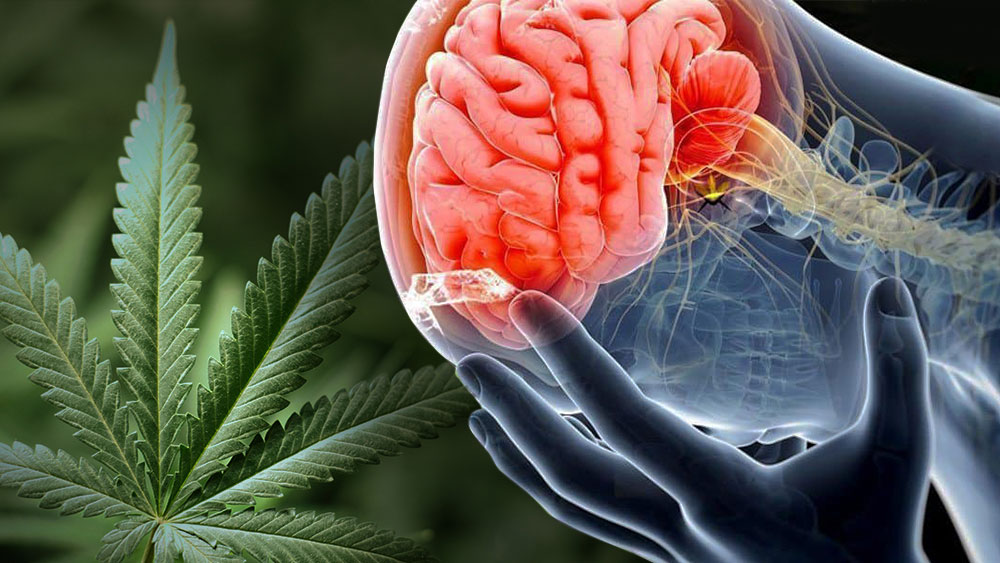
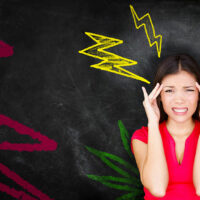
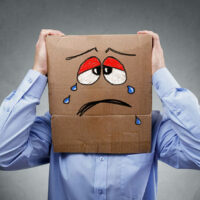

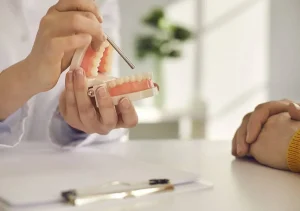
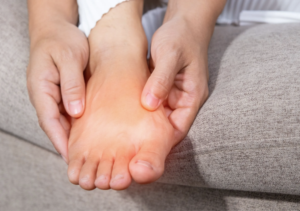
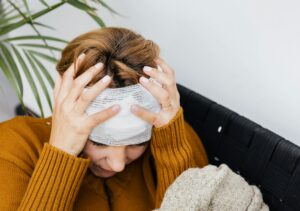
Travers July 12, 2018 at 7:42 pm
I have post concussion syndrome (PCS) going on 4 years which has created chronic fatigue syndrome. Many of the strains you list cause me a great deal of fatigue, they give you a boost of energy to fight fatigue like Jack Herer, Green Crack, etc, the problem with this is after you do get a boost of energy you crash hard. The strains that have worked for me are G-13 and Purple Kush, they don't create fatigue and the entry into the high and out of the high are gentle which works great because people with PCS have a hard time changing gears (going from rest to activity).
Helena September 5, 2018 at 10:32 am
Hey Travers, thank you for sharing this with us. Cannabis works differently on individuals, and your experience can help other patients with PCS, especially the strains you suggested.
Luke July 25, 2019 at 1:09 am
Hey Travers, I’ve had pcs for almost a year. I started using cannabis to treat it as well. Would love to hear more about your experience with it.
Mark Bennett May 12, 2020 at 12:24 am
I have had PCS for a year. Nasty case. Unfortunately cannabis is still illegal here but I do what I can. I'd love to know how you recommend to take it? I find vaping or smoking will usually trigger the concussion effects making them worse, but edibles really help with strong anti inflammatory properties kicking in. Unfortunately this wipes out most of a day.